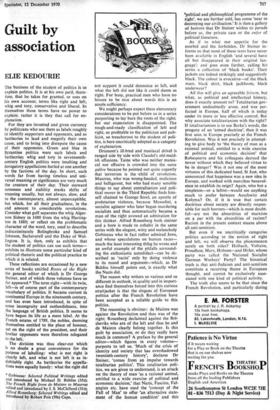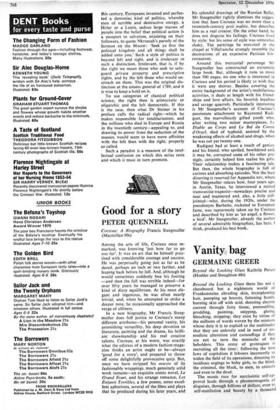Guilt by association
ELIE KEDOURIE
The business of the student of politics is to explain politics. It is at his own peril, there- fore, that he takes for granted, or uses on his own account, terms like right and left, whig -and tory, conservative and liberal. In themselves these terms have no power to explain; rather it is they that call for ex- planation.
For they are invented and given currency by politicians who use them as labels roughly to identify supporters and opponents, and as battlecries to laud and magnify their own cause, and to bring into disrepute the cause of their opponents. Green and blue in Byzantine politics were such labels and battlecries; whig and tory in seventeenth- century English politics were insulting and derogatory appellations hurled at one another by the factions of the day. In short, such words far from having timeless and uni- versal meaning or significance are very much the creature of their day. Their outward sameness and stability masks shifts of meaning usually, but not always, slow, and to the contemporary, almost unperceptible; but which, for all their gradualness, in the end amount to considerable revolutions. Consider what gulf separates the whig Alger- non Sidney in 1680 from the whig Harting- ton in 1880; or reflect on the problematic character of the word, tory, used to describe indiscriminately Bolingbroke and Samuel Johnson, Sacheverell and the Duke of Wel- lington. It is, then, only as exhibits that the student of politics can use such terms— exhibits to illustrate some particular kind of political rhetoric and the political practice to which it is related.
These reflections are occasioned by a new series of books entitled Roots of the Right the general editor of which is Dr George Steiner, and of which three volumes have so far appeared.* The term right—with its twin, left—is of course part of the contemporary vocabulary of politics. It became current in continental Europe in the nineteenth century, and has even been introduced, in spite of some incongruity and outlandishness, into the language of British politics. It seems to have begun its life as a mere label. At the French estates of 1789, the nobles, deeming themselves entitled to the place of honour, sat on the right of the president, and their lowlier opponents were therefore relegated to the left.
The division was thus clear-cut which is no doubt a great convenience for the purpose of labelling: what is not right is clearly left, and what is not left is as in- dubitably right. As battlecries the appella- tions were equally handy: what the right did
Gobineau: Selected Political Writings edited and introduced by Michael D. Biddiss (35s); The French Right from de Maistre to Maurras edited and introduced by J. S. McClelland (35s); Alfred Rosenberg: Selected Writings edited and introduced by Robert Pois (50s) Cape.
not support it could denounce as left, and what the left did not like it could damn as right. For busy, practical men who have no leisure to be nice about words this is an ample sufficiency.
We might perhaps expect these elementary considerations to be put before us in a series purporting to lay bare the roots of the right; but our expectation is disappointed. The rough-and-ready classification of left and right, so profitable to the politician and pub- licist, so treacherous to the student of poli- tics, is here uncritically adopted as a category of explanation.
Drumont's ill-bred and maniacal drivel is ranged side by side with Claudel's old-maid- ish effusions. Taine who was neither mania- cal nor effusive is crowded into the same galere because he pointed out quite cogently that terrorism is the -child of revolution. Maurras, who was wrong-headed, malicious and belligerent, but who had many sensible things to say about centralisation and poli- tical mores in the Third Republic finds him- self chained to George Sorel, an apostle of proletarian violence, because Mussolini, a socialist agitator who later began murdering socialists and thus automatically became a man of the right avowed an admiration for this thinker. Alfred Rosenberg both sinister and a bore is made to cohabit in the same series with the elegant, witty and melancholy Gobineau who in fact rather admired Jews, and whose speculations on human races— much the least interesting thing he wrote and an awful example of the pitfalls surround- ing the enthusiastic autodidact—can be de- scribed as 'racist' only by doing violence to its mood and argument—which, as Dr Biddiss himself points out, is exactly what the Nazis did.
The reason why writers so various and so different in outlook, in quality and in import- ance find themselves forced into this curious straitjacket is that the slogans of European politics after the French Revolution have been accepted as a reliable guide to this politics.
The reasoning is obvious: de Maistre was against the Revolution and thus was of the right; Rosenberg declaimed against the Bol- sheviks who are of the left and thus he and de Maistre clearly belong together. Is this guilt by association, or do they really have much in common? A preface by the general editor—which figures in every volume— purports to tell us. 'Much of the crisis of identity and society that has overshadowed twentieth-century history', declares Dr Steiner, 'comes from an impulse towards totalitarian politics'. This totalitarian poli- tics, we are given to understand, is an attack on the theory of man 'as a rational animal, entitled to a wide exercise of political and economic decision,' that Nazis, Fascists. Fal- angists etc. have used the 'concept of the Fall of Man' to offer 'an alternative state- ment of the human condition' and this
'political and philosophical programme of the right'. we are further told, has come 'near to destroying our civilisation.' It is then a gallery of horrors that Dr Steiner wishes to parade before us, the private case or the enter of political literature.
As if to whet our appetite for the morbid and the forbidden, Dr Steiner in- forms us that most of these texts have never been available in English 'and several have all but disappeared in their original lan- guage'; and goes even further, calling his series a collection of 'black books'. Their jackets are indeed strikingly and suggestively black. The colour is evocative—of the black mass, black shirt, black jackboots, black underwear?
All this will give an agreeable frisson, but what, as political and intellectual history, does it exactly amount to? Totalitarian gov- ernment undoubtedly arose, and was per- fected in Europe, half of which is today under its more or less effective control. But why associate totalitarianism with the right? If totalitarianism is to use Burke's words, the progeny of an 'armed doctrine', then it was first seen in Europe precisely at the French Revolution. Was it not precisely in attempt- ing to give body to 'the theory of man as a rational animal, entitled to a wide exercise of political and economic decision' that Robespierre and his colleagues decreed the terror without which they believed virtue to be in danger? Was it not one of the most virtuous of this dedicated band, St Just, who announced that happiness was a new idea in Europe, and worked with merciless benevol- ence to establish its reign? Again, who but a simpleton—or a leftist—would see anything much to prefer between Auschwitz and Kolyma? Or, if it is true that certain doctrines about society are directly respon- sible for such horrors—which is most doubt- ful—are not the absurdities of marxism on a par with the absurdities of racism? Racism in the present context means above all anti-semitism.
But even if we uncritically categorise politics according to the notion of right and left, we will observe the phenomenon surely on both sides? Holbach, Voltaire, Proudhon, Marx. Hobson—and Hitler, whose party was called the National Socialist German Workers' Party? The historical truth is that anti-Judaism and anti-semitism constitute a recurring theme in European thought, and cannot be exclusively asso- ciated with one kind of political activity.
The truth also seems to be that since the French Revolution, and particularly during this century, Europeans invented and perfec- ted a demoniac kind of politics, whereby
• men of terrible and destructive energy, a Hitler or a Lenin, seduce large masses of people into the belief that political action is a passport to salvation, enjoining on their followers, to quote Nkrumah's parody of the Sermon on the Mount: 'Seek ye first the political kingdom and all things shall be added unto you.' Such a style of politics is beyond left and right, and is irrelevant to such a distinction. Irrelevant, that is, if by the right we mean those who seek to safe- guard private property and prescriptive rights, and by the left those who would en- croach on them. This was the original dis- tinction at the estates general of 1789, and it is wise to keep a hold on it.
To use categories of classical political science, the right then is aristocratic or oligarchic and the left democratic. If this is the case, then what Dr Steiner in his preface calls the radical right—which he makes responsible for totalitarianism, and the millions who died in Europe and Russia in the twentieth century—appealing to, and drawing its power from the seduction of the masses, would seem to have more affinities with the left than with the right, properly so called.
Such a paradox is a measure of the intel- lectual confusion on which this series rests and which it must in turn promote.











































 Previous page
Previous page